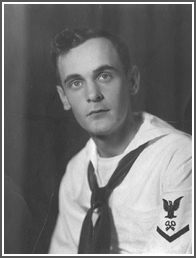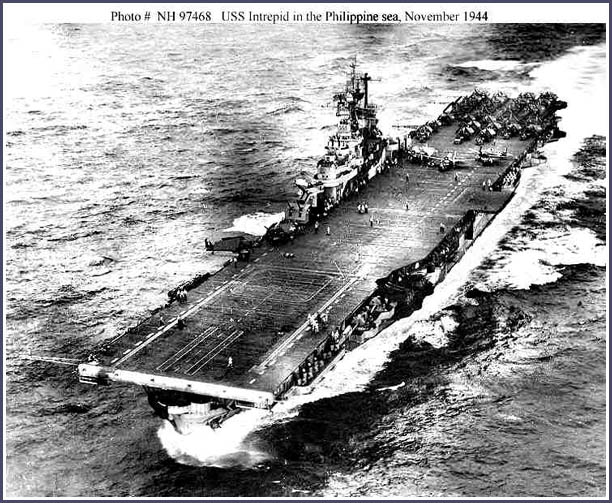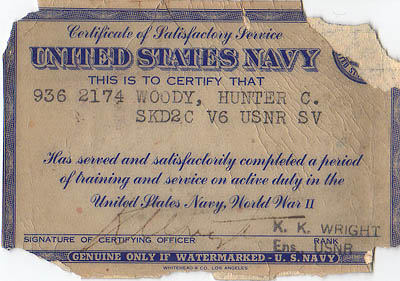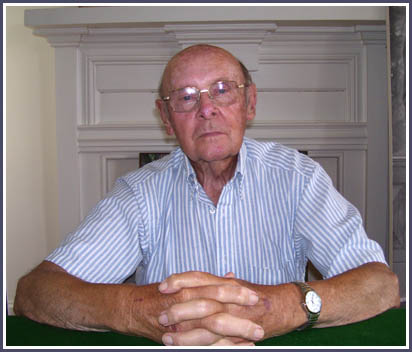
Oral Historian: Hunter C. WoodyInterview Date: 30 May 2007Interviewer: Steven KnepperMr. Woody, what is your birth date?January 13, 1926 What branch of the service were you in?I was in the United States Navy. And what was your rank when you were discharged?I was a 2nd Class Storekeeper .And where did you serve?Most of my career was served in Pearl Harbor. And what age were you when you went in?18 And you went in 1944 and were discharged in 1946, is that right?That is right. Mr. Woody, were you drafted or did you enlist?I was drafted, but I selected the Navy. They could have put me either way, but I asked for the Navy and that's what they gave me. Was there any particular reason you wanted to be in the Navy?I don't know. I was smart enough to think about it. In the Navy, I never missed a meal; in the Army, sometimes they didn't know what might happen. That was one of the pluses for the Navy. Where were you living at the time you went into the service?I was in Alberene, Virginia. What were you doing there?Basically I wasn't doing anything. It wasn't much of a job, but I was picking up some income somehow. I was working for a pencil factory in Charlottesville; they were making parts for one of the branches of the service, I'm not sure which, but probably the Army. You went into the Army fairly close to the end of the war. So do you have memories of growing up in Albemarle County, Virginia?Well, everybody was good and very concerned about the situation. And incidentally, I begged my mother when I was 17 to let me join up, and she refused. When I was 18, I didn't volunteer, but I waited until I was drafted. But I still got my choice. And how did you get most of your news from the front?The radio, just the radio. Did you have any brothers or sisters?I had two brothers and two sisters. Just the two brothers are living now. Were they older or younger than you?My brothers were younger than me; my sisters were older. Do you recall what your first days in the service were like?Well, if you'll noticed by the date when I was drafted, I went to Richmond for my physical and was sworn in. They immediately put me on a train to Great Lakes, Illinois, which is just outside Chicago. But when I left here (Richmond) the day was very warm and comfortable and so I had a very light jacket on. We got there around 11 o'clock at night maybe, and if anybody ever wants to be cold, all they have to do is go on the Great Lakes in the wintertime. So I liked to froze to death, and they had us stand around there for 4 or 5 hours. Finally they issued us our clothing. And one part of the clothing was long handle underwear, and I was pleased to put those on. I think the first pair I ever had on! But it was a cold situation, and I spent 6 weeks in boot camp and got a two week vacation. I went home for two weeks and then went back to Chicago and stayed there just a few days. And they shipped me out to California where I had my assignment to Pearl Harbor. I went to Pearl Harbor on an aircraft carrier, sleeping on the hangar deck in a hammock all the way across the ocean. So it was quite an experience for an old country boy, who had never been farther than Charlottesville.  What did you think of Chicago?Well, I was in Chicago twice. Of course, that was unreal for me to be in a city like that. But I didn't spent a lot of time because the great Lakes Naval Station was ten to twelve miles outside of Chicago. So I didn't get in there a whole lot, but I did spend a little time there, and it did suit me all right…a little bigger than Alberene. Were you trained for a specific job?No, I happened to be assigned to the job that I had. What was your job?Well, my title was 'Storekeeper,' but we did a lot of payroll. In fact, I expect I did most of my work on payroll. Do you remember anything about what your boot camp or training was like?Well, it was very different from anything I'd ever seen or heard about. But it was interesting and very busy. They tried to cram as much into you as they could. I think now that situation would probably take 90 days, but they crammed it all into us in 6 weeks. Do you remember some of the specific things they made you do?Not really more than calisthenics, and everything had to be done exactly right. I know one thing that always stuck with me: going through the chow line, they'd say, "Take all you want, but make sure you eat all you take!" And they even had a man stationed by the garbage can, checking your plates as you threw them away. That was one thing that struck me as unusual. We did quite a bit of marching --- everywhere we went, we had to march. Another thing that struck me a little bit, and that followed me all the way through the service: Woody starts with the letter 'W', and we always lined up alphabetically, which means I was always at the end of the line. Sometimes that could get real long. Do you remember your instructors?No, not by name. Do you remember what were they like - were they strict with you?I think they were fair. I didn't have any problems with them. When you got to Hawaii and Pearl Harbor, what did you think of that?That was a beautiful place. And when I was at Pearl Harbor, I was stationed on a lone island right in the middle of the harbor, which was called at that time 'Ford Island.' At that's the island now that has the world-famous museum where that Battleship Arizona was sunk. And my whole time in Pearl Harbor on Ford Island, I slept within 60 yards of that sunken ship. Very few days that I didn't walk over and look at the situation. And I would love to be able to go back, but I don't think the possibility will ever happen. I understand that it is a beautiful monument and museum, and it would be nice to go back. What was the situation like in Pearl Harbor at that time?Well, everything was busy, but the island that I was on was a -we used to call it a 'Cashew' which was a 'Carrier Out Craft Service Unit.' And we serviced out craft going onto the Pacific. So basically, that was the main job of the island that I was on and a lot of aircraft activity. Tell me about a couple of your most memorable experiences about your time?Well, one time that kind of surprised me - they brought this aircraft carrier in and the flight deck was buckled. They told us a typhoon had done that, which was almost unbelievable but they claimed it happened. Nothing too exciting, but I remember the first time there was a British plane landed there…at least while I was there. And I'm not sure, but I believe they call them a 'Spitfire', and they are little bitty planes. They reminded so much of being an angry bee - they were something else! But just the usual parts to a day. Of course, while I am thinking now, we only got one day a week off for rest and relaxation. That was a trip into Honolulu and a day of whatever you would like to do. Let's talk a little more about that a little later on. Do you remember what your daily routine was like?Basically, you got up and did your normal thing for breakfast or whatever. And I'm thinking your work day was no more than 10 hours at the most, and then, of course, you had your leisure time: time to do your laundry and whatever needed to be done. Did you have a chance to interact with any of the people from the islands?Not a whole lot, no, just when I was on liberty, I'd run into them most anywhere. How did you stay in touch with your family?Strictly through the mail. And did you correspond fairly regularly?Yes, I'd say once or twice a week. At least once a week and maybe more. Did you keep a diary during that time?No. What was the food like?The food was always very good…very good! Do you remember some of the things that you particularly liked?Just food, I'd guess you'd say. Did you have plenty of other supplies as well?Oh, yeah, we had plenty of everything we needed. So you would have been there during some of the victory celebrations as well.Oh, yeah. When the Japanese surrendered, we were there. Do you remember what that was like?Well, it was very exciting for everybody! We knew we'd be going home shortly, and it happened, you know. We weren't there too long after that. I forget the exact date...I shouldn't because everybody should remember that! Did you have a celebration there?Well, nothing unusual - no. Before that, did you get news from the front pretty regularly?Yes, yes…of course, we had the people coming in all the time from that area. Plus I'm reasonably sure we had newsletters maybe. But that's been a long time ago. Was there any worry of another attack while you were there?Personally, I wouldn't think so. But, of course, we were strictly on guard 24- hours a day, you know. Everything was tense because they sneaked in one time. But I doubt if they could have ever made it a second time. You said that you would go into Honolulu on your leave. Would you tell me a little more about those trips that you took on leave?
One thing that always stayed with me was when I first got to Honolulu -of course, being an old country boy, I had to do exactly what they said - and they had quite a few hula girls over there. And they say, "Always watch the hands because they tell a story!" So I was afraid to look anywhere else. That was kind of an amusing situation! But that did happen. But the part of Honolulu that I thought was most beautiful was the beach at Waikiki. They had a hotel, and for some reason I could have had night leave one time, and I tried to spend the night there but they were always full. So that didn't happen. But I did visit there a lot - it was such a beautiful place. I'm sure it's completely changed now, but I expect that was the most beautiful part to me. Of course, they had the slum areas in the area as most places do. But it was just a nice place to go and spend the day. Can you tell me a little bit about your friends and your fellow servicemen?I was always very lucky - I had nice friends. I never had a problem with anyone the whole time I was in service. Do you remember any specific people?No, not really. Well, I had one fellow - we went through boot camp together. They just got him under the age limit. I think that was somewhere around 40, and here I was an 18-yr. old kid. He kind of put his wings around me. There were two of them - William Wood and Paul Yoder (sp?). And they were both very good friends of mine, and I got to see both of them after the war when we were discharged from the service. Yoder died real young; he didn't live too long. William Wood lived a good while, but they both called me. Where were they from originally?One was from Ohio, but I forget where Wood was from. Do you recall any particularly humorous or unusual things that happened - you've already shared a couple, but do you remember anything else?Not really. I had one incident that happened while I was in service. When I came home on a 30-day leave from Pearl Harbor - I was approaching my discharge date which was very close -I had to report back to Norfolk when my 30-day leave was up. And they put me on a train and shipped me all the way back to California and put me on an aircraft carrier and brought me all the way back around through the Panama Canal and discharged me back in Norfolk. So I always wondered why they did that. They should have just left me in Norfolk and let me stay that time. And at that time, in order to get discharged, we were on a point system. I forget how that worked but you had to have so many points in order to get discharged. So finally I got my points and was discharged, and I've been home ever since.  Hunter Woody's Discharge Certificate from the US Navy, 23 May 1946 Did you like your job?Well, I was satisfied. Of course, I was like everybody - occasionally I got a little homesick, you know. Time goes by real fast if you stay busy, and we were always busy. Do you remember what you did to help deal with the homesickness?Not really - just forget about it and go on. Were there other people from Virginia in your unit?I'm sure there was - there had to be. But I don't particular know them. So what did you do the first days and weeks after you did finally get all the way through the Panama Canal to Norfolk and got discharged?Well, I'll tell you another something that might be of interest to you or some of our people in Scottsville. When I came home from boot camp, I came with a nice young man. He and I met back in Charlottesville, and we spent an evening, and he brought his cousin with him, who happened to be my wife today. And then we corresponded through mail for the entire time I was in the service. So we did most of our courting through the mail situation. I guess I'd been out probably a year when we got married, and we've been happily married ever since. Did you look forward to those letters?Oh, yes, definitely! I think I still have a stack of them somewhere. I probably need to destroy them before I leave this world. But yes, I did - it was a real pleasure. Just one more question about your life in the service - do you remember when you had leisure time in the evenings, what kind of activities did you like to get into?Well, about the only thing we did was they always had a beer garden, and of course, that was a good place to congregate and meet new friends and make friends. But it was a very low grade - I forget what they called it - but it wasn't a good local beer. And I never did acquire a taste for beer. But anyway, that was one of the main things people had to do in the evenings. And then we had movies - our theater in a hangar where we worked on airplanes all the time. But we had movies there every night. There was always something to do. Did you have any entertainers come?Well, we had the hula girls come, but I wasn't supposed to look at them. I listened and watched the hands. And we had USO shows, which were very nice and very interesting. What did you do as a career after the war?I guess my first job was as with Uniroyal here in Scottsville. Of course, I retired from there after 27 ½ years. It changed ownership, I believe, three times between when I began and I retired - when I got discharged I was working for Michelin Tires. So that's basically where I've spent my time is with Uniroyal. Now I've been in Scottsville and worked at Western Auto store until it changed hands. After that, I've just been working around town, doing odds and ends. Did you join a veteran's organization?No, I have not joined any - I support them all and believe in them, but I've not joined one. You said you kept in correspondence with a couple of your friends. Do you attend any reunions?No. How do you think your service and experiences in the Navy affected your life?Well, I think it gave me training. And I saw both sides of life - the good and the bad - I hope I chose the good. I feel like it's made me a better person from having served in the service. Did your military experience influence your thinking about war and the military in general?I don't know that it did, but I've always had the military on my mind since I served in it. A lot should be proud of the military! We're in a very troubling situation now. I would like to think I could see the end of it, but right now I don't believe I can. Do you think of any lessons from WWII that would be applicable to our situation today?Well, the idea of WWII was to win, and I'd sort of like to see us win in the situation we're in now, but I have no feel for it. Is there anything else you would like to add that we haven't covered in this interview?I can't think specifically of anything that might be of interest. But I've enjoyed my life. I think everything that I've been associated with has helped me through life. I appreciate all the good things that have happened. I've had a lot of good things happen to me, and I'm very thankful for it. How has Scottsville changed over the years?Well, thinking about today, it's changed a whole lot. But hopefully in another month or two, it will get back so things will be looking better. But I've enjoyed my life - Scottsville's been good to me. I've served on the Town Council for 12 or 14 years maybe, and it's always a good feeling to be able to give back just a little bit of what the town has given to me. The town has been really good to me. Is there anything else you would like to add in closing?No, not really. I would like to say that the Scottsville Museum has done an excellent job of trying to preserve the history of Scottsville and looking forward to the future, I'm sure. Well, we appreciate you taking the time to interview with us, Mr. Hunter!Well, it's my pleasure - I'm glad to do it.  Hunter Woody in Scottsville, 2007
|